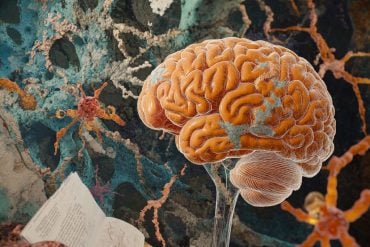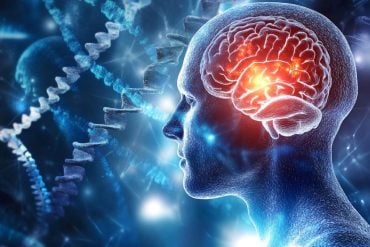Summary: Study finds significant expression of the Alzheimer’s related Tau protein in glioma cells, especially in patients with better prognoses.
Source: Michigan Medicine
A protein typically associated with neurodegenerative diseases like Alzheimer’s might help scientists explore how gliomas, a type of cancerous brain tumor, become so aggressive.
The new study, in mouse models and human brain tumor tissues, was published in Science Translational Medicine and found a significant expression of the protein TAU in glioma cells, especially in those patients with better prognoses.
Patients with glioma are given a better prognosis when their tumor expresses a mutation in a gene called isocitrate dehydrogenase 1 (IDH1). In this international collaborative study led by the Instituto de Salud Carlos III-UFIEC in Madrid, Spain, those IDHI mutations stimulated the expression of TAU. Then, the presence of TAU acted as a brake for the formation of new blood vessels, which are necessary for the aggressive behavior of the tumors.
“We report that the levels of microtubule-associated protein TAU, which have been associated with neurodegenerative diseases, are epigenetically controlled by the balance between normal and mutant IDH1/2 in mouse and human gliomas,” says co-author Maria G. Castro, Ph.D., a professor of neurosurgery and cell and developmental biology at Michigan Medicine (University of Michigan). “In IDH1/2 mutant tumors, we found that expression levels of TAU decreased with tumor progression.”

That means levels of TAU could be used as a biomarker for tumor progression in mutant IDH1/2 gliomas, Castro says.
Funding: Her team, funded by the National Institutes of Health, collaborated with lead and senior study authors at the Centro de Biología Molecular “Severo Ochoa” and the Instituto de Salud Carlos III-UFIEC, both in Madrid. Those researchers are funded by the Spanish Ministry of Economy and Competitiveness (MINECO) and the Spanish Association Against Cancer (AECC).
Source:
Michigan Medicine
Media Contacts:
Haley Otman – Michigan Medicine
Image Source:
The image is Michigan Medicine news release.
Original Research: Open access
“The IDH-TAU-EGFR triad defines the neovascular landscape of diffuse gliomas”. Maria G. Castro et al.
Science Translational Medicine doi:10.1126/scitranslmed.aax1501.
Abstract
The IDH-TAU-EGFR triad defines the neovascular landscape of diffuse gliomas
Gliomas that express the mutated isoforms of isocitrate dehydrogenase 1/2 (IDH1/2) have better prognosis than wild-type (wt) IDH1/2 gliomas. However, how these mutant (mut) proteins affect the tumor microenvironment is still a pending question. Here, we describe that the transcription of microtubule-associated protein TAU (MAPT), a gene that has been classically associated with neurodegenerative diseases, is epigenetically controlled by the balance between wt and mut IDH1/2 in mouse and human gliomas. In IDH1/2 mut tumors, we found high expression of TAU that decreased with tumor progression. Furthermore, MAPT was almost absent from tumors with epidermal growth factor receptor (EGFR) mutations, whereas its trancription negatively correlated with overall survival in gliomas carrying wt or amplified (amp) EGFR. We demonstrated that the overexpression of TAU, through the stabilization of microtubules, impaired the mesenchymal/pericyte-like transformation of glioma cells by blocking EGFR, nuclear factor kappa-light-chain-enhancer of activated B (NF-κB) and the transcriptional coactivator with PDZ-binding motif (TAZ). Our data also showed that mut EGFR induced a constitutive activation of this pathway, which was no longer sensitive to TAU. By inhibiting the transdifferentiation capacity of EGFRamp/wt tumor cells, TAU protein inhibited angiogenesis and favored vascular normalization, decreasing glioma aggressiveness and increasing their sensitivity to chemotherapy.






